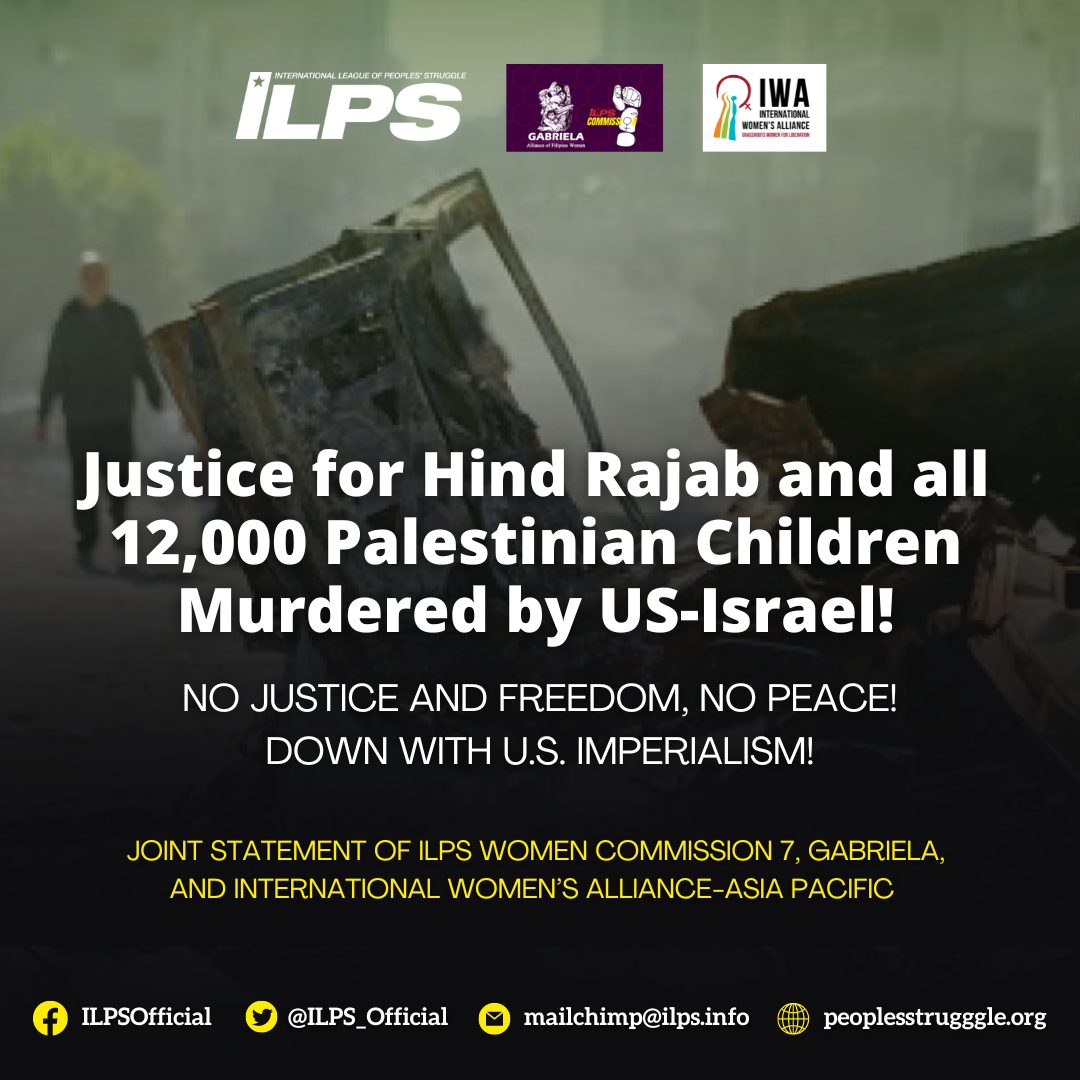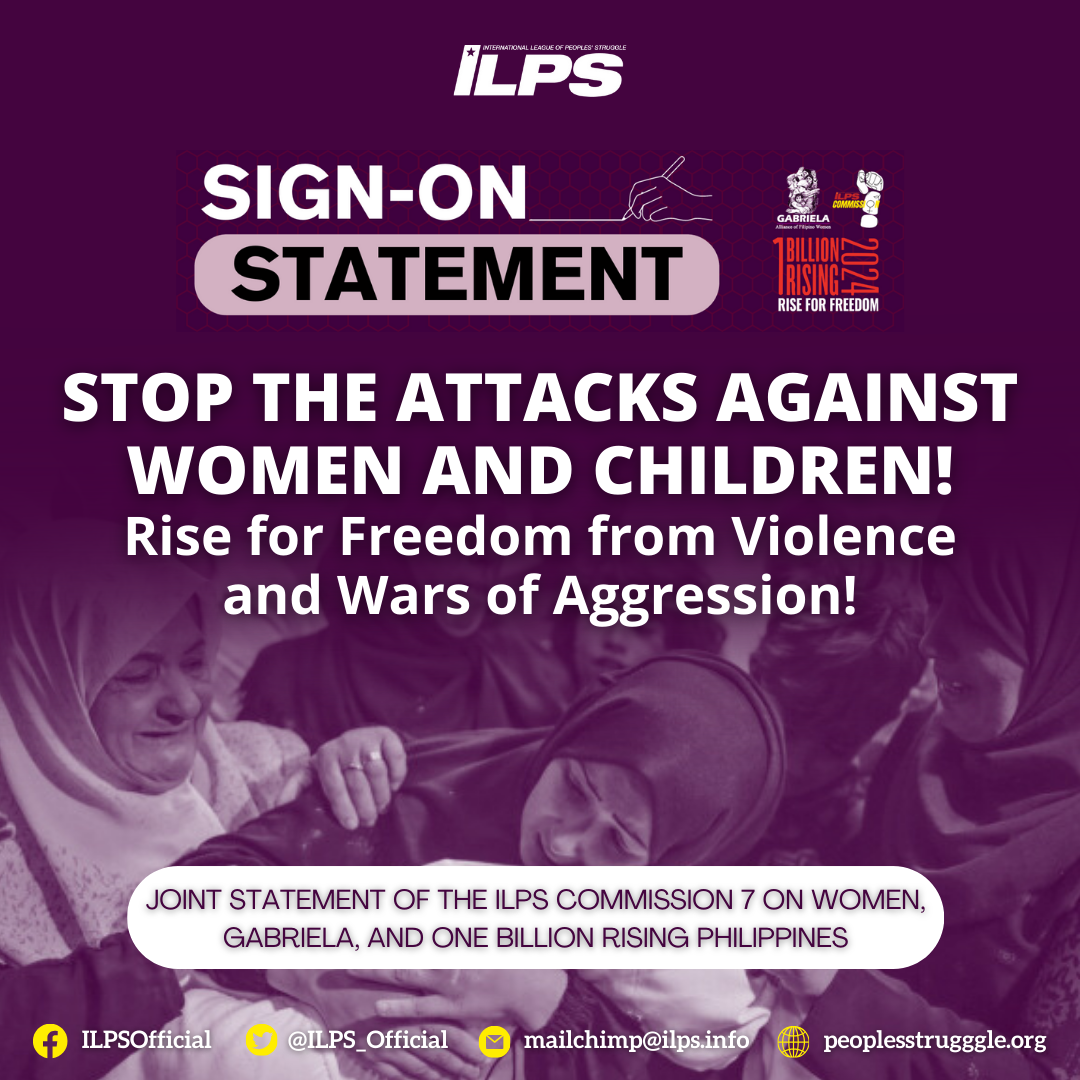by Eni Lestari
Currently, there are 270 million migrants around the world, of which 160 million are contractual migrant workers. Additionally, there are more than 60 million displaced peoples including refugees, asylum seekers and the stateless. Over the decades, the number of migrants have increased and we expect it to continue amidst the multiple crises the world is facing including the current pandemic and its impacts to migration.
Almost half of all migrants are women and in some countries, the number of women migrants is much higher than their male counterparts.
Under imperialism, migration is designed to feed the capitalist need for cheaper labor towards the extraction of superprofits. Imperialists stunt the growth of many countries through economic control, plunder of natural resources for corporate benefits, and perpetuating wars and conflicts to profit from military deals and establish military control.
This then creates a situation where many countries become a bottomless well of an army of unemployed, underemployed, and people desperate to survive who are eventually forced to sell their labour in foreign countries.
Meanwhile, ruling classes in countries of origin systematise the export of labor to keep their economies afloat through remittance and government earnings from the migration process. They capitalise on migration to prevent an explosion of public discontent over economic hardships and denial of social services.
Under this framework, I would like to present three major points on our topic today and how these figure into the building of the migrant’s movement:
First, women migrant workers are part of the working class and working people exploited and oppressed by the capitalist system. Migrants are relegated to the most 3D jobs (dirty, difficult and dangerous) with very low pay, deplorable working and living conditions, with limited or without basic rights including freedom of mobility.
Women migrants, in particular, are designated in stereotyped jobs that are considered as lower skill such as in domestic work, garment industry, hospitality sector, caregiving, and jobs in plantations. There are also significant women migrants in entertainment and healthcare. Many also become migrants through the marriage channel. In most jobs, there exist a mismatch of skills due lack of recognition of their actual qualifications. We suffer from triple exploitation as workers, as migrants and as women. For example, women migrant domestic workers are tied to very repressive immigration policies. They are paid cheaply, banned from living outside their employer’s houses because the governments are afraid they will steal local worker’s jobs and engage with sexual activities, and are oftentimes victims of violence.
Secondly, empowerment through migration because of the “feminisation of migration” is but a myth and a smokescreen to women’s oppression. It is not true that because we become the breadwinners and hold “economic power” means we are empowered. This “empowerment” only lasts as long as we are migrants and thus, based on exploitation and even modern-day slavery. It also does not remove the fact that migration of women is a result of severe impoverishment, oppression and exploitation of women in countries of origin. It cannot hide the fact that women are still second class or exploited gender even in their own family context and in patriarchal society.
Thirdly, imperialism will never resolve forced migration as it is anchored on the exploitation and oppression of colonies and semi-colonies, as well as of workers and other sectors. It will also not resolve the exploitation of migrants in countries where we live and work as migrants constitute the cheap labour that they want. It will even fan anti-migrant sentiments to keep workers form coming together and hide the truth that it is the capitalist system that deprives the people of jobs, decent living, social services, etc.
Based on these points, how then do we organise women migrants? I am a women migrant, organizer of migrants and advocate of migrant’s rights. I spend every day dealing with the problems of migrants, women migrants and family of migrant. So what are really the struggle of women migrants and what are our aspiration?
The primary struggle of women migrants is against forced migration and the fact that our home countries are continuously plundered and impoverished so we do not even have hope to return home soon. Even when the world is crumbling during the Covid-19 pandemic, women migrants are forced to survive abroad in whatever condition even if they overstay or get victimised by trafficking and syndicates just so our loved-ones will have means to live decently. The struggle of women migrant workers is embedded in the national and social liberation of our countries that will put an end to the root causes of forced migration, underdevelopment, backwardness, massive unemployment and poverty.
The insecurities and vulnerabilities of our living and working situation stem from this reality. Women migrants struggle against exploitation and violence at the workplace and in the countries where we currently work. Very low pay, mandatory live-in, long working hours, denial of rest and holidays, denial to change employment and right to residency, verbal and sexual abuses are common problems encountered by women migrants in different part of the world. We are vulnerable because the governments, corporations and employers impose very repressing regulation which deny our basic rights as workers, women and human.
We also struggle every day with homesickness due to years of separation, uncertainty, long distance relations and parenting, rocketing cost of living and various social issues. We have no choice except to endure anxiety and stress throughout their migratory journey.
The ongoing crises aggravated by the Covid-19 pandemic has magnified the grave condition of women migrants. Every time the global capitalist system experiences crisis, it is the migrants who are one of the first to be sacrificed. Many have lost jobs, were forced to go home, stranded, denied access to testing and vaccination as well as to health services, denied subsidy for repatriated migrants, deprived of rights from rest day to food, stigmatized, and discriminated. We do not know where to seek help except from the grassroots organization of migrants and advocates as well as local supporters.
Reflecting from our concrete experience, women migrants will realize the root causes of their misery when they join progressive organizations of migrants and actively participate in the struggle. The hope of women migrants lies within our own movement. No one will give us recognition, rights, dignity, and liberation if we do not fight for them. Thus, working women have always been a part of class and liberation movements – in all spheres and forms of struggle.
We also recognize that we cannot do it alone and therefore we must integrate our movement with the collective and militant peoples movement in our home country. This we should do as we also forge solidarity with local movement in countries where we live and work.
Arousing, organizing and mobilizing have been effective and resulted to many victories from wage increase, rights such as rest day or residency for some countries, legalization and visa flexibility among others. Migrant organisations have also been instrumental in generating international awareness on the situation and struggles of our people back home.
The Covid-19 pandemic is awakening many migrants from the illusion of migration. At this very point, many women migrants raise questions: what is the long term solution to our problem? What should we do now to defend our rights?
Women migrants also strive for a new system. A system that respect our rights as workers, as migrants and as women. We strive for a system creates the condition for our permanent return with a guarantee of a decent life. It is a system where we can fully participate in all spheres of the society. It is a system that liberates the oppressed which shall pave the way for the genuine emancipation of women. That system is socialism.
A socialist future without forced migration is what we strive for and struggle for together with workers and oppressed peoples.



